the fall of British Empire
大英帝国
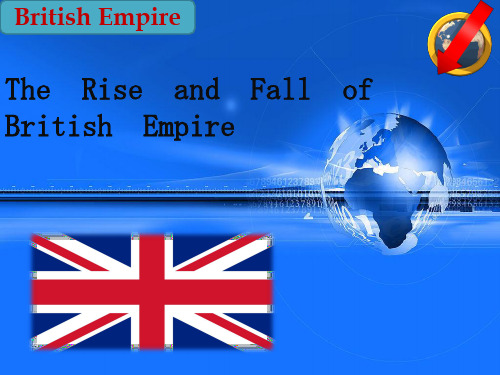
British Empire
The Rise of British Empire Expansion of the British Isles and France The growth of the overseas empire Stuart dynasty
曾经被大英帝国统治过的地区
British Empire
British Empire
The colonization
At the beginning of 20 centuries by colonial region people's national socialist high mood, have begun to challenge the colonial countries ruling status. At the same time, countries and are becoming more and more concerned about native and the surrounding countries affairs, especially after world war two this trend more apparent. India is the first to seize the historical opportunity country, after many colonies of Asia and Africa as also in succession. Although the UK in the beginning when trying to resist the momentum, but end up disastrous end, finally had to accept the new situation, and will of its old British empire into today's commonwealth.
英语国家社会文化 The Fall of the British Empire

ⅡDecline in Economy
Secondly, the era of the empire was over. Since India has gained its independence from the British Empire in 1947, the rest of the empire quickly followed its example. That’s to say, the British Empire lost most of its raw material fields and markets for British goods.
ⅡDecline in Economy
Britain is not poorer
ⅡDecline in Economy
• Britain is not poorer,or producing less than it was in 1945,in fact it is a lot wealthier and more productive than it was then.The problem is that though it has improved,other countries have improved more rapidly,hence the slide from being the 2nd largest economy to being the sixth,as it is at present.And many smaller economies have overtaken the UK in terms of output per head of population.
ⅡDecline in Economy
The Rise and Fall of the British Empire
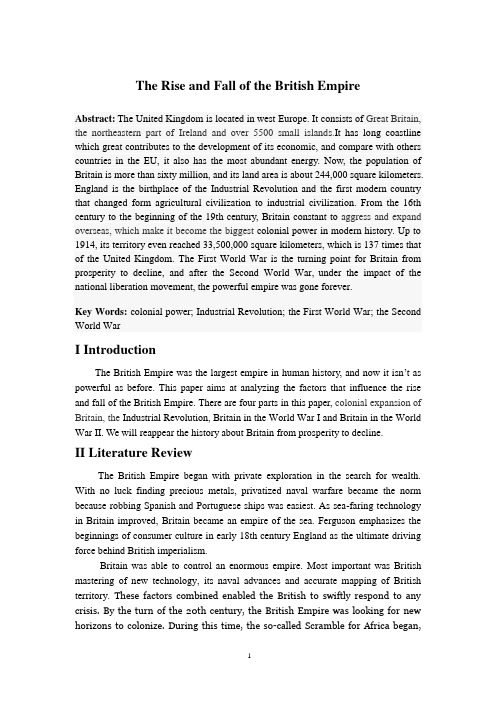
The Rise and Fall of the British EmpireAbstract:The United Kingdom is located in west Europe. It consists of Great Britain, the northeastern part of Ireland and over 5500 small islands.It has long coastline which great contributes to the development of its economic, and compare with others countries in the EU, it also has the most abundant energy. Now, the population of Britain is more than sixty million, and its land area is about 244,000 square kilometers. England is the birthplace of the Industrial Revolution and the first modern country that changed form agricultural civilization to industrial civilization. From the 16th century to the beginning of the 19th century, Britain constant to aggress and expand overseas, which make it become the biggest colonial power in modern history. Up to 1914, its territory even reached 33,500,000 square kilometers, which is 137 times that of the United Kingdom. The First World War is the turning point for Britain from prosperity to decline, and after the Second World War,under the impact of the national liberation movement, the powerful empire was gone forever.Key Words: colonial power; Industrial Revolution; the First World War; the Second World WarI IntroductionThe British Empire was the largest empire in human history, and now it isn’t as powerful as before. This paper aims at analyzing the factors that influence the rise and fall of the British Empire. There are four parts in this paper,colonial expansion of Britain, the Industrial Revolution, Britain in the World War I and Britain in the World War II. We will reappear the history about Britain from prosperity to decline.II Literature ReviewThe British Empire began with private exploration in the search for wealth. With no luck finding precious metals, privatized naval warfare became the norm because robbing Spanish and Portuguese ships was easiest. As sea-faring technology in Britain improved, Britain became an empire of the sea. Ferguson emphasizes the beginnings of consumer culture in early 18th century England as the ultimate driving force behind British imperialism.Britain was able to control an enormous empire. Most important was British mastering of new technology, its naval advances and accurate mapping of British territory. These factors combined enabled the British to swiftly respond to any crisis. By the turn of the 20th century, the British Empire was looking for new horizons to colonize. During this time, the so-called Scramble for Africa began,with an accompanying arms race among the European powers. Britain's expansion in Africa was a combination of financial power and military might. Ferguson explores the birth of three important modern phenomena, namely the mass media, the military-industrial complex, and a global bond market. According to Ferguson, those three factors brought the British Empire to its peak, but were also what would foreshadow its decline. Britain's military was weakened as it became less of a political priority, while global economic dominance shifted to the US. Although the era of European colonization has seemed to end, however, the rise and demise of the British world order and the lessons for global power by claiming that empire is still a reality. Today, though, empire is ruled by a single superpower, the United States, and takes an indirect, more abstract form of economic exploitation and political control.The British Empire fell because of its "Pyrrhic victory" in the two world wars remains a bit dubious, however. Certainly the financial burden held significant immediate consequences, but no one should discount the simultaneous impact of liberal social movements within European societies, rebellion against colonialist within British-occupied territory, and the push from the US and other (smaller) nations to liberate colonies. The horrors of the world wars had much to do with the shift in attitude, including the colonies where large numbers of soldiers were recruited as well as - obviously - in Europe itself. The so-called "era of democracy" in the Western world began with the fall of Nazi Germany and the development of the Cold War.III The Analysis of the rise and fall of the British Empire The British Empire began with the colonization in 16th century, and its first colony overseas is Newfoundland. Later, it controlled Canada, Australia, India and many small states in the West Indies. During the mid-19th century, the British consolidated its colonies by bringing them under the direct control of the government. Britain expand their colonies and sphere of influence in Asia at the beginning of the 19th century, British government waged the Opium War against China, and Hong Kong was ceded to Britain. Meanwhile, Britain also occupied Burma, Sri Lanka, Singapore, Malaya, Sarawak, Brunei and some other small states in Asia. By the end of the 19th century, the British Empire included a quarter of the global population and nearly a quarter of the world’s landmass. By the beginning of the 20th century, it occupied the Gold Coast, Niger, Sudan, Kenya, Uganda, North Rhodesia, Upper Nigeria and South Africa. On the Eve of World War I, Britain was the largest colonial empire the world had ever seen. It controlled a territory of 33.5 million square kilometers, about a quarter of the world’s landmass, about 137 times as large as Britain. It ruled over a population of 393.5 million, about eight times that of Britain itself. The British boasted that they had an empire on which the sun never set.After the Glorious Revolution, the British Parliament was made up of prosperousmerchants and entrepreneurs who supported commerce and industry. Otherwise, Britain fought and won a series of wars against France, which help it won more colonies overseas, and those colonies provided Britain with necessary raw materials and a large market for its industrial products. From the colonies in America and India, England, acquired enormous wealth with which to develop its industries. All these things resulted in the Industrial Revolution. Industrial Revolution began in the textile industry and was marked by a series of important inventions, such as the Spinning Jenny, the water frame, the spinning mule, the power loom and the steam engine. These inventions completed the mechanization of the textile industry and prepared the way for a new system of production: large scale industry. With these developments came a need for a cheap means of transportation. By 1850, Britain had established a railway system encompassing over 10,000 kilometers of track. By the middle of the 19th century, the Industrial Revolution was accomplished in Britain. It changed Britain in many ways. Its industrial productivity increased dramatically. Britain became the most advanced industrial country and also the financial center in the world.By the beginning of the 20th century, the world had entered the period of imperialism. Britain's dominance was challenged by other European nations and the United States, for they had also been industrialized and each were eager to protect their own markets and expand their influence. The power balance in Europe had undergone enormous changes. A conflict of interests and colonial rivalry divided Europe into two camps. The conflict plunged the whole world into two devastating wars. More than 32 countries were involved World War I. Though Britain won this war finally, the cost of the war was great. Britain was drained of its manpower and 70% of the merchant ships were sunk or damaged. As a result, Britain lost the sea supremacy. Business was slack, many factories were closed down and taxes soared. The great depression brought additional problems to the Britain economy and society. Britain’s position in the capitalist world was further weakened. World War II was for all intents and purposes a continuation of World War I. As the result of World War II, most of Britain’s colonies demanded and fought for independence. In the 1960s, an independence movement swept the entire British Empire. More than 20 countries won their independence. The Empire had been replaced by the British Commonwealth of Nations.IV ConclusionIt’s the contingency of the necessity that England chose capitalism and successfully founded the Britain Empire, which was once the largest empire in human history. Though there are so many events and elements contributed to the rise of the Great Britain, there are still many variables because other countries were also developing well with expansion. During the world wars, the few odds hadn’t stood with Britain though Britain was the final winner. So I think it is the wars and the Great Depression that result in the fall of the British Empire.References[1]马歇尔. 剑桥插图大英帝国史[M].北京:世界知识出版社,2004[2]李涛,姜晓东.白金汉宫的倒影——看日不落帝国的兴衰[M].北京:中国友谊出版社,2007[3]凤凰网专稿.大历史下看英国兴衰100年[EB/OL]. /zaixianjiangtang/zjjs/detail_2012_05/09/1441209 5_0.shtml,2012-05-09[4]刘中民,张宝霞.崛起与错失——海权强国兴衰的历史解读[J].海洋期刊,2007(10):75-80[5]唐晋.大国崛起[M].北京:人民出版社,2006[6]金城,阎晓明.世界历史——英帝国的兴衰[EB/OL]. /v_show/id_XMjA1Mzc4MzY=.html?f=1355559,4年前。
Chapter5The Rise and Fall of the__ British Empire
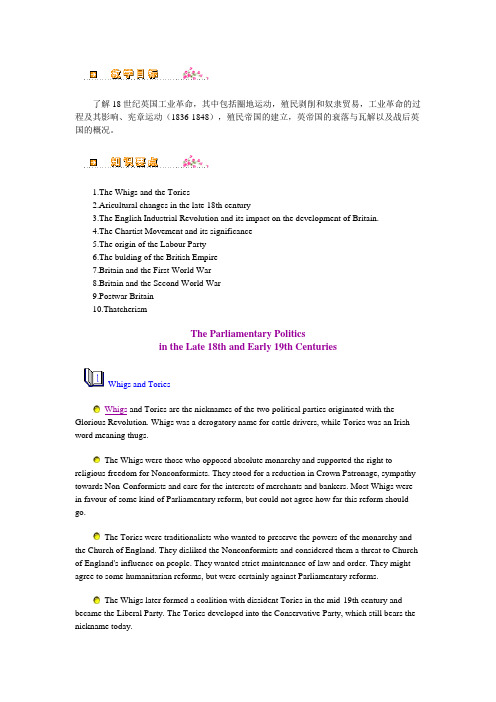
了解18世纪英国工业革命,其中包括圈地运动,殖民剥削和奴隶贸易,工业革命的过程及其影响、宪章运动(1836-1848),殖民帝国的建立,英帝国的衰落与瓦解以及战后英国的概况。
1.The Whigs and the Tories2.Aricultural changes in the late 18th century3.The English Industrial Revolution and its impact on the development of Britain.4.The Chartist Movement and its significance5.The origin of the Labour Party6.The bulding of the British Empire7.Britain and the First World War8.Britain and the Second World War9.Postwar Britain10.ThatcherismThe Parliamentary Politicsin the Late 18th and Early 19th CenturiesWhigs and ToriesWhigs and Tories are the nicknames of the two political parties originated with the Glorious Revolution. Whigs was a derogatory name for cattle drivers, while Tories was an Irish word meaning thugs.The Whigs were those who opposed absolute monarchy and supported the right to religious freedom for Nonconformists. They stood for a reduction in Crown Patronage, sympathy towards Non-Conformists and care for the interests of merchants and bankers. Most Whigs were in favour of some kind of Parliamentary reform, but could not agree how far this reform should go.The Tories were traditionalists who wanted to preserve the powers of the monarchy and the Church of England. They disliked the Nonconformists and considered them a threat to Church of England's influence on people. They wanted strict maintenance of law and order. They might agree to some humanitarian reforms, but were certainly against Parliamentary reforms.The Whigs later formed a coalition with dissident Tories in the mid-19th century and became the Liberal Party. The Tories developed into the Conservative Party, which still bears the nickname today.RadicalsThe Radicals were another force in the Parliament. They wanted fundamental reforms to get to the root of the problems, and their one common aim was the thorough reform of the Parliamentary system. Small as they were, the Radicals were active in Parliament spreading their radical ideas.They were greatly influenced by Jeremy Bentham's ideals known as 'Utilitarianism'. He suggested that government's function should be to achieve 'the greatest happiness of the greatest number', and this should be done in two ways: firstly, government and administration should be made as efficient as possible; secondly, government should interfere as little as possible with the lives of the people as individuals.They advocated laissez faire, a radical idea of free trade, because they believed that the import and export duties interfered with the natural flow of trade.Agricultural Changesin the Late 18th CenturyTraditional farming system: Open field villageVillages were surrounded by 3 great hedgeless fields. Each year only two of them were cultivated, so that the fallow field recovered its richness after two years' cultivation. The farming was done on a community basis. There were also commons and wastelands used by all villages to graze livestock.This system was an ideal basis for the simple community life of the countryside and the subsistence farming before the modern industrial age. There were of course drawbacks. It wasted land, labour, and time; livestock farming was difficult in winter, and diseases spread quickly on commons; it was a barrier to experiments.Land enclosuresIn the mid-18th century the population in England increased rapidly. Demands for greater productivity made the landowners replace the small farms cultivated on the open-field system by larger, more efficient farms with hedge divided fields.During the late 18th and early 19th centuries, the open-field system ended when the Enclosure Acts enabled wealthier landowners to seize any land and divide it into enclosed fields.Enclosure became more frequent after 1740 and climaxed during the turn of the century, when the war against Napoleon meant high food prices.Changes in farming methodsA system of crop rotation was introduced. This meant land could be fully used while the cultivation of fodder crops enabled livestock to be kept through the winter months.Artificial fertilizer and new agricultural machinery, such as seed drill invented by Jethro Tull (1674-1741) also made arable farming more efficient and profitable.Selective breeding of livestock introduced by Porbert Bakewell (1725-95) made animals much heavier than ever before.The idea of encouraging tenants to introduce the changes was associated with Thomas Coke (1754-1842) of Norfolk in Southern England. George III (1760-1820), King of the United Kingdom of the House of Hanover was given the nickname 'Farmer George', because he was very enthusiastic about the agricultural changes at Windsor.Consequences of enclosuresFarms became bigger and consumer goods became more varied.Enclosure was a disaster for the tenants. They were evicted from their lands and had to look for work in towns, which rapidly became hopelessly overcrowded.In Ireland and Scottish Highlands, land enclosure led to mass emigration, partic ularly to the New World.A new class hostility was introduced into rural relationships. The labourers were forced to leave the land to survive because of concentration of land in fewer hands and loss of common land for animals.The Industrial Revolution (1780-1830)Factors leading to the Industrial RevolutionThe Industrial Revolution refers to the mechanization of industry and the consequent changes in social and economic organization in Britain in the late 18th and early 19th centuries. Britain became the first country to industrialize because of the following factors:Britain is well placed geographically to participate in European and world trade. Its main towns are not too far from seaports or rivers. It also has many natural resources, such as mineral resources, and rivers useful for transport as well as for water and steam power.Britain had a peaceful society after the Glorious Revolution. Under the influence of laissez faire and 'Protestant work ethic', it was increasingly interested in overseas trade and colonies, which provided capital in large quantities for industrialization. And the Constitutional Monarchy ensured that the powerful economic interests in the community could exert their influence over Government policy.The enclosures and other improvements in agriculture made their contributions by providing food for the rising population, labour for the factories, and some of the raw materials needed by industry.Britain had many well-trained engineers and craftsmen. The inventors were respected. They solved the practical problems.England, Scotland, and Wales formed a customs union after 1707, and this included Ireland after 1807. So the national market was not hindered by the internal customs barriers.Development of the Industrial RevolutionWhile the movement to enclose the land and use new agricultural methods was at its height, similar changes took place in manufacture. New techniques and water powered machines resulted in organization of industries on a large scale. At this time population became increasingly concentrated in towns, especially in Midlands, North of England, Southern Wales and Central Scotland, which provided the desperately needed laborers for the industrialization.Changes occurred earliest and quickest in textiles, especially silk and cotton, which were first to adopt factory methods of production. By 1760, the silk industry was well established, although it was still no competition for the French and Italians. The real ‘revolution’ in the silk industry was in 1770 when power-driven machinery was introduced.Cotton had been slow to develop, because cotton was mostly imported from West Indies and America, and spinning pure cotton was difficult. Technology aided weaving at first. John Kay's flying shuttle (1733) speeded up hand weaving and created demand for faster spinning. Then spinning was revolutionized by James Hargreaves' spinning jenny (1766), which enabled one hand labourer to spin many threads at a time. Richard Arkwright's water frame (1769) and Samuel Crompton's mule (1779) replaced hand labour altogether, and required waterpower andsteam to drive them. Edmund Cartwright's power loom (1784) eventually enabled weaving to catch up with spinning. British cotton now rivaled the best products of the East.The first steam engine was devised by Thomas Newcomer at the end of the 17th century. In 1765, James Watt (1736-1819), the Scottish inventor, modified and improved the design, and produced a very efficient steam engine with rotary motion that could be applied to textile and other machinery.The most important element in speeding industrialization was Abraham Darby's success in melting iron with coke instead of charcoal in 1709, which hugely increased the production of iron that was used for machinery, railways and shipping. In the forging side of the iron industry,Henry Court's pudding and rolling processes (1840) enabled vastly increased quantities of high-quality iron to replace wood and stone in many sectors of the economy.Improved Transportation, e.g. road and canal construction, ran parallel with production. By the early 19th century, Britain had a road network of some 200,000 km.Consequences of the Industrial RevolutionAs a result of the industrialization, Britain was by 1830 the 'workshop of the world'. No other country was yet ready to compete with her in industrial production. Towns grew rapidly and became the source of the nation's wealth. The north of England was now the most advanced in Britain.The Industrial revolution created the industrial working class, i.e. the proletariat who had to work and live in extremely bad conditions. Because the working men's livelihood had been destroyed by the mechanization, the 'Luddites', led by Ned Ludd, attempted to destroy the hated machines, but were severely punished by the government.The Chartist Movement (1836-48)Factors contributing to the political change in EnglandTwo great international eventsIn the closing decades of the 18th century, two events greatly alarmed the British ruling classes. The first was the American War of Independence (1776), in which the colonists fought for equality, national identity and political representation. Their war cry 'no tax without representation' encouraged the British middle class and working class to struggle forrepresentation in Parliaments, which represented only aristocrats at that time. The second was the French Revolution (1789-93), in which people fought for liberty, equality and fraternity.The general election of 1830Political change in England did not come through revolution but through gradual reform. When the Whigs under Charles Grey (1830-34) were returned to power at the general election of 1830, they turned their minds to the problems of parliamentary reform.Parliamentary reforms (1830-34)Reasons for parliamentary reformsPower was monopolized by the aristocratsIn the 18th and 19th centuries the Lords had far more influence in Parliament than the Commons. Most important ministers were aristocrats and bishops of Church, while the Commons were elected only by a small proportion of the population, and the vote was only a privilege for a small number of male citizens. Besides, the MPs were not paid.Representation of county and town, and North and South was unfair.The county seats and borough seats were very unfairly distributed. All counties with property worth 40 shillings annually could vote two members of Parliament, although some southern villages had already been deserted; but new northern cities like Manchester had no seats, although they were densely populated.There were also so-called rotten or pocket boroughs.Rotten boroughs were those deserted market towns, which had been busy before, but they could still elect MPs. In pocket boroughs, elections were not won by political views but by influence, and the candidate could buy off the voters, so that even before the election, the seat was already 'in his pocket'.Reform Bills passed in the time of the Whigs' GovernmentThe Reform Act of 1832, also called the Greater Charter of 1832, abolished 'rotten boroughs' and redistributed parliamentary seats more fairly among the growing towns. It also gave the vote to many householders and tenants, based on the value of their property.The New Poor Law of 1834 forced the poor people into workhouses instead of giving them sufficient money to survive in their own homes.The Chartist Movement (1836-48)The London Working Men's Association and the People's Charter(1836-38)Dissatisfied with the two Reform Bills and the failure of attempts to develop trade unionism, some radicals and militant workers were determined to renew the working class fight for political equality.In 1836 a group of skilled workers and small shopkeepers, led by William Lovett, formed the London Working Men's Association, aiming to seek every legal means to place all classes ofsociety in possession of equal political and social rights.In 1838 they drew up a charter of political demands (the People's Charter), with the intention of presenting it to Parliament. It had six points: the vote for all adult males, voting by secret ballot, equal electoral districts, abolition of property qualifications for MPs, payments of MPs, annual Parliaments with a General Election every June.The Chartist groups (1838)Other working men formed Chartist groups throughout the country. In 1838 they held a great meeting in Birmingham to launch the movement officially, with the aim of pressing Parliament to accept the People's Charter.The Chartists could be roughly divided into two groups: the Moral Force Chartists and the Physical Force Chartists. The former, headed by William Lovett, wanted to realize their aims by peaceful means (‘politics of persuasion'), while the latter, headed by Feargus O'Connor, wanted to achieve their purpose by violence.The climax and the end of the movement (1839-48)In 1839, a National Convention was held in London. But it revealed conflicts within the movement and great differences between the Northerners (who were fundamentallyanti-industrialists) and the men from the Midlands and London.In November 1839, Chartist riots occurred in Birmingham, Sheffield and Newport, and 24 Chartists were killed in a full-scale rising.In 1840 and 1842, two petitions were presented to Parliament, but both were rejected. At the same time, the Chartist movement was widely split.In 1848, the proposed great Chartist Demonstration ended quietly with the third petition presented to Parliament.Reasons for the failure of the Chartist MovementThe Movement failed because of its weak and divided leadership, its lack of coordination with trade unionism, and the immaturity of the working class.Significance of the Chartist MovementIt was the first nationwide working class movement and drew attention to serious problems. The 6 points achieved very gradually from 1858 to 1918, although the sixth has never been practical. Lenin considered it as the first broad, really mass, political formed, proletarian revolutionary movement.Trade Unions and the Labour PartyEarly trade unionsOwing to the Industrial Revolution, the new working class became established in the industrial towns in the late 18th century. They became aware of the power they could possess if they acted together instead of separately. So various working class organizations such as friendly societies and mutual insurance companies were formed to bring about improvements in their standards of living.However, the movements were regarded by the government as possible centers of revolution. Consequently Parliament passed the Combination Acts of 1799-1800 to forbid the formation of unions. After these laws were cancelled in 1824, the 1825 Act allowed workers to form unions but not to obstruct workers and employers. It was now illegal to strike.The Grand National Consolidated Trade Union (GNCTU)Most early trade unions were small and local. From 1825, large unions began to combine workers in different parts of the country.In 1833, the Grand National Consolidated Trade Union was established to form a national union. But it came to nothing after six Dorsetshire agricultural laborers were tried and transported in 1834 on the charge of administering false oaths.New UnionismFrom 1850, working class energies were taken up with other movements such as the Chartist Movement and the Anti-Corn Law league. And a new kind of trade unionism developed among skilled workers, such as the Amalgamated Society of Engineers (ASE), which was the model for other national craft unions formed in 1850s and 1860s.These new trade unions offered benefits for sickness, unemployment or old age to their members who had paid a certain sum of money per week. But they placed strict restriction of entry to their trades so as to avoid confrontations with employers as far as possible. As a result, this New Unionism was not favored by all workers.Trades Union Congress (TUC)In the 1860s, trade unionists began to meet regularly to discuss matters of common interests, such as regulation of hours, technical education, and conditions of apprenticeship.In 1868, the TUC was started, thus the trade unionism had a national organization capable of coordinating the interests of industrial workers.New legal security for the trade unionsTrade unions had always lacked legal rights. They had to fight two strong opponents together-employers and the State. In the time of the Liberal Government, two new laws were passed to give the movement new legal security.The Trade Union Act of 1871 legalized the trade unions and gave financial security. This meant that, in law there was no difference between collecting money for benefit purposes and collecting money to support strike action.The Conspiracy and Protection of Property Act of 1876 gave unions the right to exist as corporation, able to own property and to defend their rights cooperatively in courts of law.Formation of the Labour PartyThe Labour Party had its origins in the Independent Labour Party (ILP), which was formed in 1893, and led by Keir Hardie, a Scottish miner. The ILP was too idealistic and its leaders too individualistic to become a mass party. So the foundation of an effective party for labour would depend on the trade unions.In 1900, representatives of trade unions (TUC), the ILP and a number of small socialist societies set up the Labour Representation Committee (LRC), with the simple aim to promote the interests of labour in Parliament.In 1906, the LRC changed its name to the Labour Party in time for the General Election of that year. The Labour Party participated in the war coalition government in 1915-18, became the main opposition party in 1922, and formed majority government in 1924 and 1929-35 under Ramsay Macdonald.Colonial ExpansionThe building of the British EmpireEnglish colonial expansion began with the colonization of Newfoundland in 1583.In the early 18th century, settlements were made in North America, while commercial companies were chartered to trade with other lands, notably the British East Company in India.In the late 18th century and the early 19th century, the British colonialists stepped up their expansion, encouraged by Britain's control of the seas, the discoveries of men like Captain Cook, especially by the rising tide of emigration.By 1900 Britain had set up a big empire, 'on which the sun never set'. It consisted of a vast number of protectorates, Crown Colonies, spheres of influences, and self-governing dominions, and it included 25% of the world's population and area.The growth of dominionsCanadaCanada was ceded to Britain by the 1763 Treaty of Paris, after the Seven Years' War (1756-63) between Britain and France.French rights were guaranteed by the Quebec Act of 1774.The Canada Act of 1791 divided Canada into Upper Canada (Ontario) where the British had settled, and Lower Canada (Quebec) populated by the French.One serious revolt against British rule took place in 1837-38.The British North America Act of 1867 established Canada as a dominion. The four founding provinces were Quebec, Ontario, Nova Scotia and New Brunswick.AustraliaAustralia was first discovered by the Dutch in the early 1600s.In 1770, Captain James Cook discovered Botany Bay, and claimed the east coast region for Britain, naming it New South Wales.In 1788, the English began to transport convicts to Australia.Free settlement began in 1816, and no convicts were sent to Australia after 1840.In 1851-92, the gold rushes brought more people here.In 1901, the six self-governing colonies were united in one dominion-the independent Commonwealth of Australia.New ZealandNew Zealand was settled by Maoris in about the 14th century.In 1642, the Dutch seaman Abel Tasman sighted New Zealand and named it the Netherlands province of Zeeland.In 1770s, Captain James Cook visited New Zealand and claimed it for England.In the early 19th century, missionaries became active to come here.In 1840, the systematic colonization was begun by the New Zealand Company.In 1841, the country was made a separate colony, according to the Treaty of Waitangi between Britain and the Maori Chiefs.It achieved self-government in 1852, became a dominion under the British crown in 1907, and was made completely independent in 1931.The Conquest of IndiaThe establishment of the British East India Company in 1600 was a case of economic penetration. The company took control of areas and as a result the British government becamedirectly involved in Indian Affairs. The India Act of 1784 set up a 'Board of Control' to supervise the company.Political instability and French interference promoted further intervention. By 1819, the British conquest of India was almost complete.The Indian Mutiny of 1857 was raised by the native troops of the Bengal army of the East India Company, because of resentment at the British reforms of ancient Indian institutions; fear of forcible conversion to Christianity; and the issue of cartridges greased with cow-fat and pig-fat which offended Hindus and Muslims respectively.After the mutiny, the control of India passed to the British Crown in 1858, and Queen Victoria (1837-1901) became Empress of India in 1877.The Scramble for AfricaThe South of AfricaIn1652, the Dutch East India Company established a settlement at Cape Town. Settlement extended inland to form Cape Colony in the 18th century.In 1806, Britain took the Cape Colony to protect it route to India. Increasing numbers of British settlers arrived in the 1820s.In 1835-36, in order to escape British domination, the native Boers moved northward in the Great Trek (mass migration) to Natal, the Transvaal and the Orange Free State. Britain took Natal in 1843 but recognized the independence of the Transvaal in 1852 and the Orange Free State in 1854.Relations between the British colony and the Boer republics became worse, especially when Britain took Griqualand of the Orange Free State in 1871 when diamonds had been discovered there.An attempt to take the Transvaal in 1877 resulted in war between Britain and the Boers (1880-81) in which Britain was defeated and the independence of Transvaal was recognized.The discovery of gold at Witwatersrand in1886 brought many new immigrants, known as Uitlanders, to the Transvaal. But the President of Transvaal refused to give them the right to vote. This, together with the Jameson Raid in 1895, resulted in the Boer War (1899-1902). After the British victory, the Transvaal and the Orange Free State became British colonies in 1902. In 1910, they were united with the Cape Province and Natal to form the Union of South Africa.The West and the Interior of AfricaAt the beginning of the 19th century, British possessions were confined to forts and slave trading posts on the West Coast.Over the 19th century, the interior of Africa was gradually discovered and colonized by Europeans. In 1885, the involved European countries signed a treaty in Berlin to lay down rules of conducting the scramble for Africa.By 1900, more than 9/10 had been colonized. Britain led the way in this race to take the fertile and productive areas of Africa.The North East of AfricaThe French influence in Egypt was strong since the French engineers built the Sues Canal, and the French owned half the shares in the Canal Company.In 1875, the British government bought almost all the remaining Canal shares from the bankrupt Egyptian ruler, who abdicated in 1879. In 1882-1914, the British occupied Egypt.In 1899, Sudan was put under the joint Anglo-Egyptian rule after the failure of the Mahdi revolt against Egypt in 1881.Aggression against ChinaBritain, France and Germany were also rivals in establishing trading posts and naval stations in the Far East. In the 1830s, British merchants began to smuggle opium to China from India.In 1839, the Chinese, led by the Imperial Commissioner Lin Zexu, confiscated the British opium and burnt them at Canton. This resulted in the Opium war (1840-42) between Britain and China. By the Treaty of Nanking (1842), China ceded Hong Kong to Britain, and opened ports to British trade. Britain were to receive over £6 million war indemnity.After the Second Opium War (1856-58), China was forced to sign the treaties of Tianjin (1858) with Britain, France, Russia and the US, by which 11 more ports were opened.Twentieth CenturyBritain before the First World War (1901-14)Reforms continued to come year by yearFactory Acts made further improvements in conditions of work.Housing Acts got rid of some of the worst slums.Education Acts brought free schools and free school meals to poor children.Women's position in society was gradually improved.In 1897 women started to demand the right to vote in national elections. Within ten years these women, the 'suffragettes' led by Mrs. Pankhurst, had become famous for the extreme methods they were willing to use. But the First World War interrupted their campaign.Thanks to this militant feminist movement before the WWI, votes were granted to women over 30 as soon as the war was over, and to all women over 21, equal with men, ten years later in 1929.The Liberal government (1905-22) carried out some reformsThe Parliament Act of 1911 severely limited the powers of the Lords and established the Commons as the supreme legislative body. The MPs were granted an annual salary of £400.The National Insurance Act of 1911 provided insurance against sickness and unemployment. Maternity grants and elder pensions were also established.Unions were granted protection from liability for losses caused by strikes. Labour exchanges were established and minimum wages were fixed in certain industriesThe Problem of Ireland remained unsolvedThe Home Rule Bill of 1914 set up an Irish Parliament with limited powers. But it wasn't applied until after the WWI.Britain and the First World War (1914-18)Two European power blocsAt the beginning of the 20th century, France, Germany and America were becoming powerful competitors for world markets. The new united German state was emerging as the biggest threat to Britain.The War was fought primarily between two European power blocs: the Central Powers (Germany and Austria-Hungary), and the Allies (Britain, France and Russia). In wartime, the former were joined by Turkey and Bulgaria, and the latter were joined by Japan, Italy, the U.S.A. and other countries.Beginning of the WarOn June 28,1914, the Austrian Crown Prince Franz Ferdinand was assassinated by a Serbian nationalist.On July 28, Austria, awaiting a pretext for suppressing Slav nationalism, declared war on Serbia, with Germany's blessing. Russia immediately mobilized, and France rejected Germany's demand for its neutrality.Germany declared war on Russia on August 1, and on France on August 3, then invaded Belgium, hoping to win a quick victory in the West before returning to Russia.Britain's entry into the WarOn August 4, Britain declared war on Germany.There were two reasons for Britain's entry into the war. Firstly, Britain was afraid that Germany would overrun Europe and gain control of parts of the British Empire. Secondly, Britain had a treaty with Belgium to guarantee its neutrality.End of the WarOn November 11, 1918, an armistice came into effect after the Central Powers sued for peace.。
英美国家概况 Britain in and after the Two World Wars
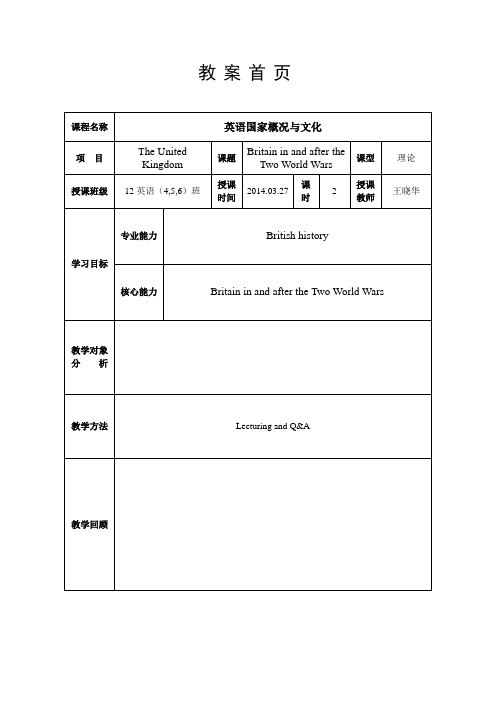
Christianityquietlyspread in Roman Britain
For centuries, Christianity had beengaininghold inBritainwithmonks such as St. Augustine of Canterbury spreading the faith andestablishingmonasteries.By the end of 7thcentury, all of the kings of theBritish IsleswereChristianized.
Consequences:The King Charles’s arm was defeated. Charles I was beheaded.In 1649, the House of Lords and the office of King were abolishedanda Council of State was set to carry the executive work of the government, andEnglandwas declared a Commonwealth.
6.Britainatthestart of the 21stcentury
7. What does it mean to be British?
A) Changes in population
B) Summary:“There will always be anEngland”
III. Questions for discussion:
3)Elizabeth I’s achievements
6.How did theUKparliament come into being? How did the major political parties evolve?
英语国家概况课后大题翻译
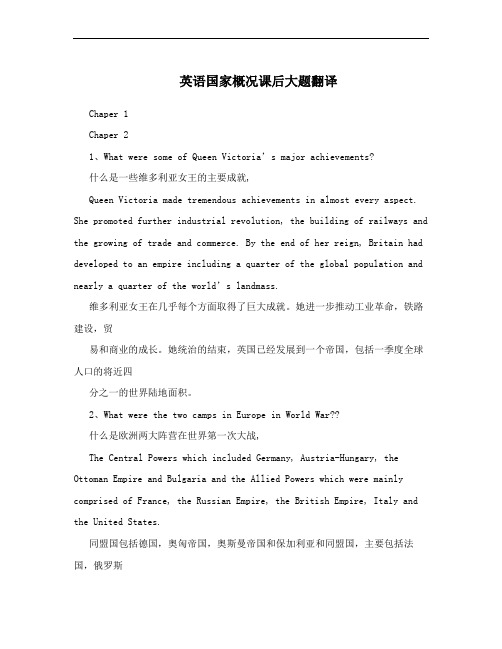
英语国家概况课后大题翻译Chaper 1Chaper 21、What were some of Queen Victoria’s major achievements?什么是一些维多利亚女王的主要成就,Queen Victoria made tremendous achievements in almost every aspect. She promoted further industrial revolution, the building of railways and the growing of trade and commerce. By the end of her reign, Britain had developed to an empire including a quarter of the global population and nearly a quarter of the world’s landmass.维多利亚女王在几乎每个方面取得了巨大成就。
她进一步推动工业革命,铁路建设,贸易和商业的成长。
她统治的结束,英国已经发展到一个帝国,包括一季度全球人口的将近四分之一的世界陆地面积。
2、What were the two camps in Europe in World War??什么是欧洲两大阵营在世界第一次大战,The Central Powers which included Germany, Austria-Hungary, the Ottoman Empire and Bulgaria and the Allied Powers which were mainly comprised of France, the Russian Empire, the British Empire, Italy and the United States.同盟国包括德国,奥匈帝国,奥斯曼帝国和保加利亚和同盟国,主要包括法国,俄罗斯帝国,大英帝国,意大利和美国。
5-The Rise and Fall of theBritish Empire 大英帝国的兴衰
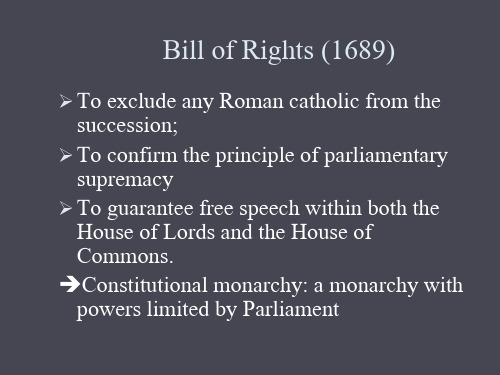
Results of Agricultural Enclosure
l. Farms became bigger and bigger units as the great bought up the small.
2. More vegetables, more milk and more dairy produce were consumed, and diet became more varied.
Open Field Village
This system was an ideal basis for the simple community life of the countryside and subsistence farming before the modern industrial age. subsistence farming: Subsistence farming in agriculture is the growth of crops predominantly for self consumption. Farmers focus on growing food and keeping animals to feed their families rather than growing crops for sale. This kind of farming reduces the cost and expenses of a household.
Agricultural Changes
➢ artificial fertilizer ➢ new agricultural machinery (e. g. seed
《英语国家概况》自学教材目录及考试大纲
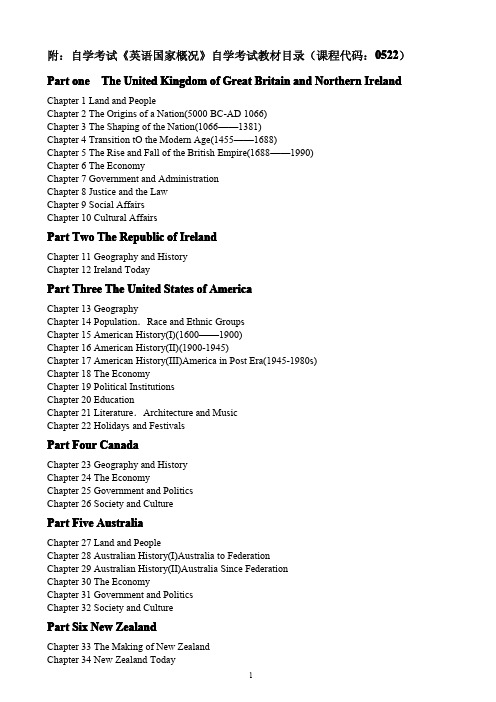
附:自学考试《英语国家概况》自学考试教材目录(课程代码:0522)Part one The United Kingdom of Great Britain and Northern Ireland Chapter1Land and PeopleChapter2The Origins of a Nation(5000BC-AD1066)Chapter3The Shaping of the Nation(1066——1381)Chapter4Transition tO the Modern Age(1455——1688)Chapter5The Rise and Fall of the British Empire(1688——1990)Chapter6The EconomyChapter7Government and AdministrationChapter8Justice and the LawChapter9Social AffairsChapter10Cultural AffairsPart Two The Republic of IrelandChapter11Geography and HistoryChapter12Ireland TodayPart Three The United States of AmericaChapter13GeographyChapter14Population.Race and Ethnic GroupsChapter15American History(I)(1600——1900)Chapter16American History(II)(1900-1945)Chapter17American History(III)America in Post Era(1945-1980s)Chapter18The EconomyChapter19Political InstitutionsChapter20EducationChapter21Literature.Architecture and MusicChapter22Holidays and FestivalsPart Four CanadaChapter23Geography and HistoryChapter24The EconomyChapter25Government and PoliticsChapter26Society and CulturePart Five AustraliaChapter27Land and PeopleChapter28Australian History(I)Australia to FederationChapter29Australian History(II)Australia Since FederationChapter30The EconomyChapter31Government and PoliticsChapter32Society and CulturePart Six New ZealandChapter33The Making of New ZealandChapter34New Zealand Today第一部分英国概况第一章国土和人民第二章英国民族起源(5000BC~AD1066)第三章民族的形成(1066~1381)第四章向现代过渡时期的英国(1455~1688)第五章大英帝国的兴衰(1688~1990)第六章经济第七章英国政府机构第八章法律与司法机构第九章英国社会第十章英国文化第二部分爱尔兰概况第十一章爱尔兰地理与历史第十二章今日爱尔兰第三部分美国概况第十三章美国地理第十四章人口、种族和种族集团第十五章美国历史(I)(1600~1900)第十六章美国历史(II)(1900~1945)第十七章美国历史(III)二次大战后的美国(1945-1980S)第十八章美国经济第十九章政治体制第二十章教育第二十一章文学、建筑和音乐第二十二章假日和节日第四部分加拿大概况第二十三章加拿大地理与历史第二十四章加拿大经济第二十五章加拿大政府与政治第二十六章加拿大的社会与文化第五部分澳大利亚概况第二十七章土地与人民第二十八章澳大利亚联邦成立之前的历史第二十九章澳大利亚联邦成立以来的历史第三十章澳大利亚经济第三十一章澳大利亚政府与政治制度第三十二章澳大利亚社会与文化第六部分新西兰概况第三十三章新西兰地理与历史第三十四章今日新西兰附件:《英语国家概况自学考试大纲》的考核目标Part One The United Kingdom of Great Britain and Northern Ireland Chapter1Land and PeopleI.Different Names for Britain and its PartsChapter2The Origins of a NationI.Early Settlers3.The CeltsII.Roman BritainIII.The Anglo-SaxonsⅣ.The Viking and Danish InvasionsV.The Norman ConquestChapter3The Shaping of the NationⅠ.Norman Rule1.William’s RuleⅡ.The Great Charter and the Beginning of Parliament1.The Great CharterⅢ.The Hundred Years’War with FranceⅣ.The Black Death and the Peasant UprisingChapter4Transition to the Modern AgeⅠ.Transition to the Modern AgeⅡ.The English ReformationⅢ.Elizabeth I1.Elizabeth and Parliament2.Elizabeth’s Religious Reform3.Elizabeth’s Foreign PolicyⅣ.The English RenaissanceVII.The Civil WarsVIII.The CommonwealthIX.The Restoration and the Glorious Revolution of1688Chapter5The Rise and Fall of the British EmpireⅠ.Whigs and ToriesⅡ.Agricultural Changes in the Late18th CenturyⅢ.The Industrial RevolutionⅣ.The Chartist MovementVII.Twentieth Century1.Britain and the First World War3.Britain and the Second World War4.Postwar BritainChapter7Government and AdministrationⅠ.The MonarchyⅡ.Parliament1.The House of Lords2.The House of CommonsⅢ.The Cabinet and MinistryⅣ.The Privy CouncilChapter8Justice and the LawIV.The JudiciaryV.PoliceChapter9Social AffairsⅠ.Health and Social Services1.The National Health ServiceⅢ.Religion1.Established churchesⅣ.Festivals and Public Holidays1.Christian festivals2.Other festivals3.Public holidaysChapter10Cultural AffairsⅠ.Education3.Higher educationⅡ.The Media1.NewspapersⅢ.SportsⅣ.The Arts3.DramaPart Two The Republic of Ireland Chapter11Geography and HistoryI.Geographical FeaturesII.Climate and WeatherIII.Population and ReligionIV.Historical backgroundPart Three The United States of America Chapter14Population,Race and Ethnic GroupsI.IntroductionIV.Racial and Ethnic Minorities1.BlacksChapter15American History(I)Ⅰ.Discovery of the New WorldⅡ.The Colonial PeriodⅢ.The War of IndependenceⅣ.A New Form of GovernmentⅥ.Territorial Expansion and Westward MovementⅦ.The Civil WarⅧ.Rapid Growth of Capitalism after the Civil WarChapter16American History(II)Ⅰ.Economic DevelopmentⅡ.ProgressivismⅢ.World War I and the United StatesⅣ.The United States in the1920sⅤ.The Great Depression and the New DealⅥ.World War II and the United StatesChapter17American History(III)Ⅰ.The Origins of the Cold WarⅡ.The Truman Doctrine and the Marshall Plan V.McCarthyismVII.American Society During the Postwar Boom:1945-1960s VIII.The Cuban Missile CrisisIX.The Vietnam WarX.United States’Relations with ChinaXII.Watergate ScandalChapter18The Economy(Two paragraphs)Ⅰ.The Economic System of the United StatesV.Foreign TradeVI.Problems in the U.S.EconomyChapter19Political InstitutionsⅠ.The U.S.Constitution1.The Federal system2.Separation of powers:checks and balances3.Provisions for amendmentⅡ.The Executive Branch1.The Presidency2.Presidential PowersⅢ.The Legislative Branch2.Powers of the House and Senate3.Officers of the Congress4.Functions of the CongressⅤ.Political Parties(two-party system)Chapter20EducationⅠ.Characteristics of American EducationⅡ.Elementary and Secondary EducationⅢ.Higher EducationⅤ.Education ReformsChapter21Literature,Architecture and MusicⅠ.American Literature1.Washington Irving2.Emerson and Hawthorne3.Mark Twain4.Whitman and Dickinson5.Theodore Dreiser6.T.S.Eliot7.Ernest Hemingway8.Hughes and WrightChapter22Holidays and FestivalsⅠ.New Year’s DayIV.Valentine’s DayVI.Easter DayVIII.Independence DayIX.HalloweenXI.Thanksgiving DayⅩII.Christmas DayPart Four Canada Chapter23Geography and HistoryⅠ.Geographic Features4.Geographic regionsⅡ.The making of Canada1.The European discovery3.Self-government and Confederation4.The Canadian nationChapter26Society and CultureI.Canadian Society1.Population2.Immigration3.Bilingualism4.MulticulturalismPart Five Australia Chapter27Land and peopleⅠ.The Geographical Structure1.The Great Western Plateau2.The Eastern Highlands3.The Central Eastern LowlandsⅡ.Climate3.Causes and effects of the hot and dry climate Ⅳ.People1.Population2.Population density and distributionⅤ.Australia’s Built Environment1.Sprawling cities2.Rural areasⅥ.Political Divisions1.New South Wales2.Victoria3.Queensland4.South Australia5.West Australia6.TasmaniaChapter32Society and CultureIV.Australian Culture1.Aboriginal culture2.Modern Australian culturePart Six New Zealand Chapter33The Making of New ZealandⅠ.GeographyⅡ.ClimateⅢ.Plants and AnimalsⅣ.Historical Background2.The Treaty of Waitangi1840VI.Maoritanga5.Race relations《<英语国家概况>自考辅导》目录(配合《英语国家概况》余志远,外语教学与研究出版社2005版)Part One The United Kingdom of Great Britain and North IrelandChapter1Land and People(英国的国土与人民)Chapter2The origins of the Nation(国家的起源)Chapter3The Shaping of the Nation(英国的形式)Chapter4Transition to the Modern Age(向现代过度的英国)Chapter5The Rise and Fall of the British Empire(英帝国的兴衰)Chapter6The Economy(英国经济)Chapter7Government and Administration(英国政府机构)Chapter8Justice and the Law(法律和司法机构)Chapter9Social Affairs(社会事务)Chapter10Cultural Affairs(文化事务)Part Two The Republic of IrelandThe Republic of Ireland(爱尔兰共和国)Part Three United States of AmericaChapter1A Survey of American Natural Circumstances and Geography(美国的自然环境和地理概况)Chapter2People and Ethnic Groups(人口和名族)Chapter3American History(Ⅰ)(1600-1900)(美国历史)Chapter4American History(Ⅱ)(1900-1945)(美国历史)Chapter5American History(Ⅲ)(1945-1980s’)(美国历史)Chapter6American Literature(美国文学)Chapter7American Economy(美国经济)Chapter8American Politics(美国政治)Chapter9American Education(教育)Chapter10American Music,Architecture and Newspaper(音乐、建筑和报纸)Chapter11Holidays and Festivals(美国的节假日)Part Four CanadaChapter1The History of Chanada(加拿大的历史)Chapter2Canadian Geography(加拿大地理)Chapter3The Economy(经济)Chapter4Government and Politics(政府和政治)Chapter5Society and Culture(社会与文化)Part Five AustraliaChapter1Australia”s Land and People(澳大利亚的国土与人口)Chapter2Australian History(澳大利亚历史)Chapter3Australian Economy(澳大利亚经济)Chapter4Polotical System(澳大利亚政治体制)Chapter5Society and Culture(社会与文化)Part Six New ZealandChapter1The making of New of New Zealand(地理与历史)Chapter2New Zealand Today(今日新新西兰)。
The Rise and Fall of the British Empire
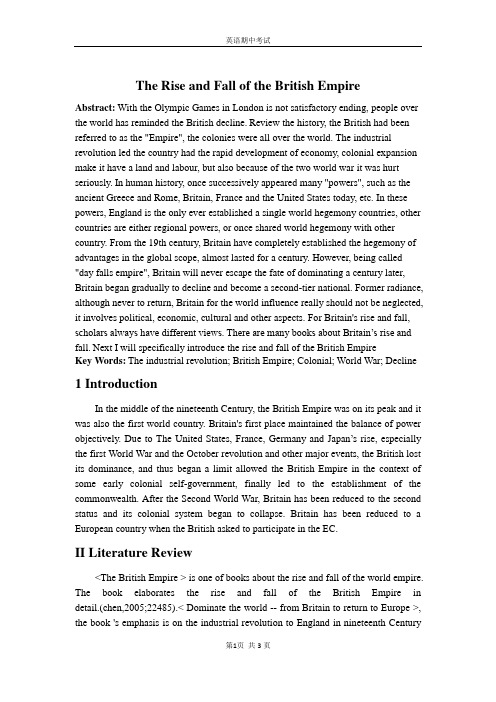
The Rise and Fall of the British EmpireAbstract:With the Olympic Games in London is not satisfactory ending, people over the world has reminded the British decline.Review the history, the British had been referred to as the "Empire", the colonies were all over the world. The industrial revolution led the country had the rapid development of economy, colonial expansion make it have a land and labour, but also because of the two world war it was hurt seriously.In human history, once successively appeared many "powers", such as the ancient Greece and Rome, Britain, France and the United States today, etc. In these powers, England is the only ever established a single world hegemony countries, other countries are either regional powers, or once shared world hegemony with other country. From the 19th century, Britain have completely established the hegemony of advantages in the global scope, almost lasted for a century. However, being called "day falls empire", Britain will never escape the fate of dominating a century later, Britain began gradually to decline and become a second-tier national. Former radiance, although never to return, Britain for the world influence really should not be neglected, it involves political, economic, cultural and other aspects. For Britain's rise and fall, scholars always have different views. There are many books about Britain’s rise and fall.Next I will specifically introduce the rise and fall of the British EmpireKey W ords:The industrial revolution; British Empire; Colonial; World War; Decline1 IntroductionIn the middle of the nineteenth Century, the British Empire was on its peak and it was also the first world country. Britain's first place maintained the balance of power objectively. Due to The United States, France, Germany and Japan’s rise, especially the first World War and the October revolution and other major events, the British lost its dominance, and thus began a limit allowed the British Empire in the context of some early colonial self-government, finally led to the establishment of the commonwealth. After the Second World War, Britain has been reduced to the second status and its colonial system began to collapse. Britain has been reduced to a European country when the British asked to participate in the EC.II Literature Review<The British Empire > is one of books about the rise and fall of the world empire. The book elaborates the rise and fall of the British Empire in detail.(chen,2005;22485).< Dominate the world -- from Britain to return to Europe >, the book 's emphasis is on the industrial revolution to England in nineteenth Centuryto dominate the world, and then developed the "British disease ",at last it went to the decline of this history in the UK. The book also introduces the period of internal chaos to rise and fall history and explores its track and summarizes its experience and lessons.(qi,2005 )III The Analysis of the rise and fall of the British empireIn eighteen forties ,with the British Industrial Revolution had finished, England began to extend further outwardly its colonies. In addition with the revolution of science and technology in other fields widely used ( especially in the field of military ) Britain maintained a world-class most advanced navy, which for its overseas colonial expansion and consolidation of the " empire " to provide a strong backing of the force. To 1860 time, about 1/4 of the world's land is " the Empire ". But 50 years later it was on the decline, the beginning of the twentieth Century two world war left " empire " era is gone further. In its reasons I personally opinions is mainly British after the eighteen seventies failed to keep pace with the development trend of the world and the British economy owing to the limitations of conservative thought has not been much development. Britain in the world economy dominant position is shaken, and between 1929 to 1933 the world economic crisis and 6 years later ( 1939) the outbreak of the Second World War brought the British declined from " dominate the world " to " return to Europe ".Finally the empire became the history.I will introduce the reason of Britain’s decline in detail.The first, British is the world’s capitalism pioneer, but does not mean that it will be the leading forever. As far as the system, other countries follow the British established emerging capitalist system, and according to their actual situations to develop their economy. If methods are useful, overtaking the United Kingdom is possible.The second, the international situation was changed. Early capitalist, capitalist international market has not yet formed, was also developed, therefore, has not been perfect market only by expanding the consumer 's land area, plunder of raw materials to maintain and develop. When the United States, Germany, Japan and other emerging capitalist countries like France and old capitalist countries to catch up, the international market basically perfect, has formed a stable supply of raw materials and consumer groups. At this time the competition between each country depends on national industrial system technology, capital strength. At this time, the British capitalists are not good for the nation plays an important role in the industry, but more take a fancy to gain easier to overseas trade, many capital outflow to the colonies led to the domestic industry a general lack of funds, will not be able to update the technology, the industrial system tends gradually aging. At the same time, Germany,the United States, Japan and other emerging capitalist countries because of not so much of the colony, so are efforts to update technology, to achieve more market share, access to income. Finally, the British have stronger instead began to lag behind, while other countries on the rise.The third, the t wo World War ‘s combat. The two world war are basic to Europe as the main battlefield, the long war was a great drain on Britain's national power during the war, and many of his original sphere of influence and economic and political influence is the United States of America replaced, this is also a very important reason.The last one, the colonial independence movement was happened. The colonies became independent gave the declining empire a heavy destroy, and due to it lost a number of previous origin of raw materials and the overseas market. The recession and exogenous shocking led to the decline of the British empire.IV ConclusionRise and fall of the British Empire, is a hot topic in academic circles. It is from a small ocean island to dominate the world's " empire ", in the now regression second-rate European countries, its development history is full of legendary color. Its decline in a sense also marks the western hegemony for a period in the history of the war end and represents the decline of hegemony color.From the development history of Britain's rise and fall, we can draw some lessons: timely to face up to themselves, to straighten out his own position, seize opportunity, advance with the times. Timely adjust their international and domestic policy, in order to better adapt to the trend of world development, change the unreasonable economic and political system, make their own country more prosperous and powerful.References[1] 罗志如、厉以宁:《二十世纪的英国经济——“英国病”研究》[M],人民出版社1982年版,第59页。
the fall of the British Empire
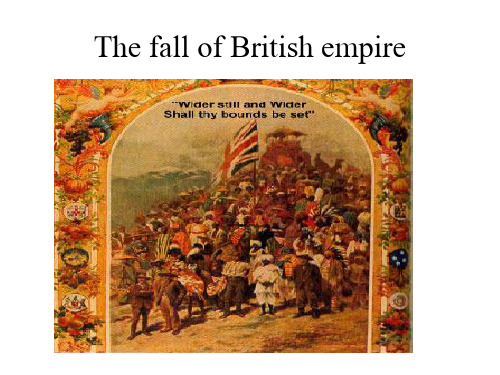
Inequality and strict hierarchy
As history repeatedly demonstrates, a presence of inequality typically results in resentment 怨恨 and rebellious 难以控制的acts. A crown colony (英国直辖殖民地), which in the hierarchy of British Colonialism, was at the bottom of the pile. Inhabitants of a crown colony had no say 发言权 in the way they were governed, either at home or abroad. Not surprisingly, this action caused considerable resentment among the colonies
The Threats to Britain’s Empire
British fortunes suffered during the high tide of imperialism [im'piəriəlizəm] 帝国主义 from 1897 to 1907. The South African, or Boer, War (1899-1902) against the independent Boer republics of the South African interior proved longer and costlier than the British expected, and although they won the "dirty little war" the British saw their world position erode受到了威胁.
The Rise and Fall of the British Empire(英国的兴盛与衰落之大宪章)

What was the Magna Carta?
Magna Carta, English Great Charter, the charter of English liberties granted by King John on June 15, 1215, at Runnymede(兰尼米德) under threat of civil war and reissued with alterations in 1216, 1217, and 1225.
The Rise and Fall of the British Empire
Introduction of the Whigs and Tories and Conservative Party and Liberal Party and Labor Party What was the Magna Carta? And its significance of the Chartism Movement What was about the East India Company and Suez Canal Brief introduction to Winston Churchill and Margaret Thatcher
Opening of the preamble(序文) to Magna Carta of 1215; in the British Library (Cotton MS Augustus II 106).
Reproduced by permission of the British Library Board
Its significance of the Chartist ent
The Rise and Fall of British Empire(压缩版)

题目The Rise and Fall of British Empire要求Write an article of around 400 words. Try to cover the factors accounting for colonization and overseas expansion, important monarches, major colonies, how the Empire declined and its effect. You can make use of resources but need to condense(压缩) the content and limit the words.The Rise and Fall of British EmpireGreat Britain, a small island which lies in the Atlantic Ocean, was once little-known and had several millions of people. What's more, her territorial resources were also limited. However, she is the first country to open the door to the modern world and had once been the leading power of the western countries; also she branded an indelible mark on the human civilization.With the decline of the feudalism and the increase of the influence of the new-born bourgeoisie, she began her capitalist development. During the Tudor Monarchy, the clothing industry developed very fast, so landowners expelled their tenants and enclosedtheir field so that they could have more profit. Meanwhile, the discovery of New Lands and adventures voyages broke the old traditional mentality, provided a large market for commodity production. After the Britain Bourgeois Revolution, Parliament secured the dominant position in political life in Britain, so its policies would promote the Industrial Revolution greatly. The British Industrial Revolution was a great result of the social development in Britain. It marked the beginning of a new era in the history of mankind. In 1588, Britain beat the Armada, which not only established the position of England as a major sea power but also paved the way for its foreign expansion; the brutish just drove away or killed off the natives to make room for Britain colonies.All these factors enabled Britain to be the workshop of the world and London became the financial centre of the world trade. However, in the late 19th century, with the rise of America and German and other factors, Britain began declining……During the second industrial revolution, Britain was experienced the disadvantages of having been the first nation to industrialize: their machinery and equipment was old and in some cases obsolete whereas the Americans and Germans could start with the latest technology available. With the two world wars over, Britain had faced the fact that it was no longer a major power. It would no longer keep up pretences: its cities had been damaged, its navy and army stretched to the limit, itswar debt enormous. The October Revolution led to a national liberation movements in British colonies. Within two decades, most of British colonies became independent. Therefore, Britain suffered a decided in production and foreign trade relative to its prewar status.Looking back from her rise to her decline , it is not difficult to see that Britain can become the most powerful country because of creating a new system of civilization, however, her decline is also because her system cannot adapt to the development of the new age. Whether the British disease can cure or not is still to be seen in the future.。
英国国家概况(五)(中英文版)
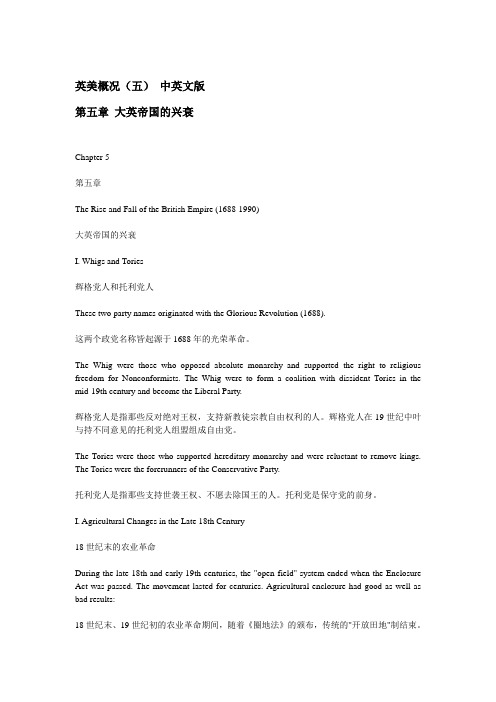
英美概况(五)中英文版第五章大英帝国的兴衰Chapter 5第五章The Rise and Fall of the British Empire (1688-1990)大英帝国的兴衰I. Whigs and Tories辉格党人和托利党人These two party names originated with the Glorious Revolution (1688).这两个政党名称皆起源于1688年的光荣革命。
The Whig were those who opposed absolute monarchy and supported the right to religious freedom for Nonconformists. The Whig were to form a coalition with dissident Tories in the mid-19th century and become the Liberal Party.辉格党人是指那些反对绝对王权,支持新教徒宗教自由权利的人。
辉格党人在19世纪中叶与持不同意见的托利党人组盟组成自由党。
The Tories were those who supported hereditary monarchy and were reluctant to remove kings. The Tories were the forerunners of the Conservative Party.托利党人是指那些支持世袭王权、不愿去除国王的人。
托利党是保守党的前身。
I. Agricultural Changes in the Late 18th Century18世纪末的农业革命During the late 18th and early 19th centuries, the "open-field" system ended when the Enclosure Act was passed. The movement lasted for centuries. Agricultural enclosure had good as well as bad results:18世纪末、19世纪初的农业革命期间,随着《圈地法》的颁布,传统的"开放田地"制结束。
3_the_rise_and_fall_of_the_British_Empire(chapter_5)大英帝国的兴衰
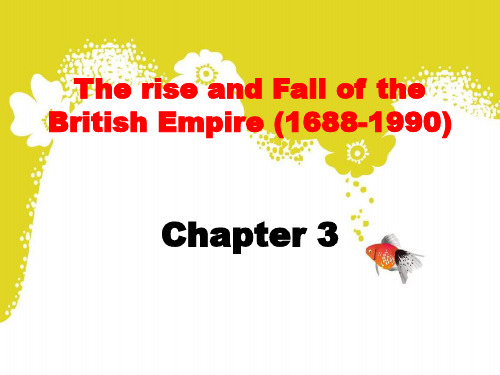
The Industrial Revolution (1780-1830)(2)
• The nhn Kay, 1733, flying shuttle James Hargreaves, 1766, spinning jenny Richard Arkwright, 1769, waterframe Samuel Crompton, 1779, mule Scottish inventor James Watt, 1765, steam engine • In 1709, Abraham Darby succeeded in smelting iron with coke instead of charcoal. • Improved transportation ran parallel with production.
The Industrial Revolution (1780-1830)(3)
• As a result of the industrial revolution, Britain was by 1830 the “workshop of the world”; no other country was yet ready to compete with her in industrial production. The Industrial revolution created the industrial working class, the proletariat, and it later led to trade unionism.
Colonies
1,Canda ,Australia ,New Zealand (dominion英联
邦自治领域) 2, India(“brightest jewel” on the English Crown) 3,Hong Kong(Opium War,Treaty of Nanking) 4,Burma,SriLanka,Singapore,Malaya,Sarawak,Bru nei, small states in the West Indies and Asia. 5,took control of Suez Canal and conquered Egypt. 6,the Gold Coast, Niger, Sudan, Kenya, Uganda, Zambia,Upper Nigeria
The Rise and Fall of the British Empire
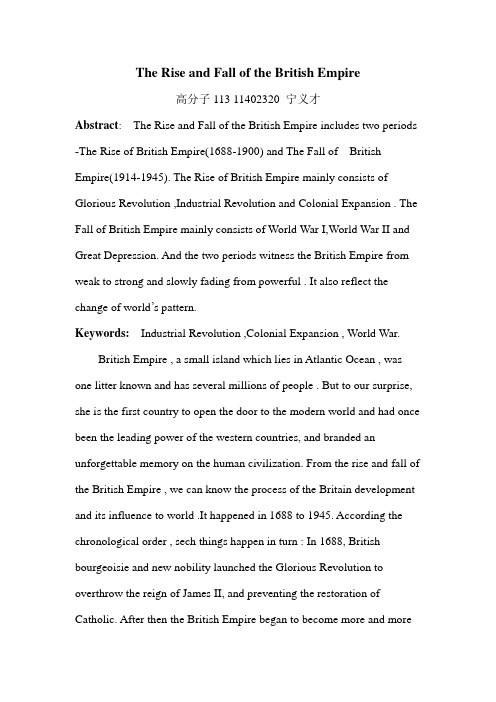
The Rise and Fall of the British Empire高分子113 11402320 宁义才Abstract: The Rise and Fall of the British Empire includes two periods -The Rise of British Empire(1688-1900) and The Fall of British Empire(1914-1945). The Rise of British Empire mainly consists of Glorious Revolution ,Industrial Revolution and Colonial Expansion . The Fall of British Empire mainly consists of World War I,World War II and Great Depression. And the two periods witness the British Empire from weak to strong and slowly fading from powerful . It also reflect the change of world’s pattern.Keywords:Industrial Revolution ,Colonial Expansion , World War.British Empire , a small island which lies in Atlantic Ocean , was one litter known and has several millions of people . But to our surprise, she is the first country to open the door to the modern world and had once been the leading power of the western countries, and branded an unforgettable memory on the human civilization. From the rise and fall of the British Empire , we can know the process of the Britain development and its influence to world .It happened in 1688 to 1945. According the chronological order , sech things happen in turn : In 1688, British bourgeoisie and new nobility launched the Glorious Revolution to overthrow the reign of James II, and preventing the restoration of Catholic. After then the British Empire began to become more and morepowerful from the Glorious Revolution on . In 1780 , Britain firstly started the Industrial Revolution and continuously to develop their economic in order to became strong and ruled the world .At the same time , they crazily expanded their colony. Britain conqueredIndia ,Africa,China in succession and get lots of profits from it . From the Industrial Revolution and Colonial Expansion , the British Empire became the most powerful country in the world and once called the Empire the sun never set . On the country, the British Empire began to move towards to decadence. And in 1931 ,Britain was entering the Great Depression by the effects of the New York Stock Market Crash of 1929.And the World War II was the of the British Empire.LiuJun once said “ British overseas colonial expansion of the British , Colony not only to Britain but the world has an important historical significance “ on his analysis of History of Cambridge illustrations of the British Empire . It tells us that the Colonial Expansion is very important to Britain and the British Empire would not exist without the Colonial Expansion. British colonial expansion began with the colonization of Newfoundland in 1583 and quickly encroached Canada, Australia, and New Zealand in the late 18th and early 19th centuries. Absolutely , the British Empire had got lots ofmoney ,resources, labor force to develop their own economy.So the colonial expansion is very important to the rise of the British Empire.Marx once pointed out that the using of machine is the beginning of the Industrial Revolution .This sentence tells the importance of the Industrial Revolution and let we know that the Industrial Revolution had a very huge influence to the rise of British Empire . When the World War I began, the British Empire began slowly be the way of decadence .During the two World War , the British Empire even lost all of its colony and its economic and industry was at a standstill.Finally the British Empire was end .As to the Rise and Fall of British Empire ,the author thinks that it may divide into two periods ,one is the rise of the British empire and the other is the fall of the British empire .And the rise of British empire may consists of two most important things-Industrial Revolution and Colonial Expansion .The fall of the British Empire mainly consists of the three parts-World War I and World War II and Great Depression . The Industrial Revolution refers to the mechanization of industrial and the consequent changes in social and economic organization in Britain in the late 18th and early 19th centuries. It had greatly promoted the development of the industry of Britain .After Industrial Revolution , Britain was by 1830 the workshop of the world , in addition ,the towns of Britain grew rapidly and became the source of the nation’s wealth .By means of Industrial Revolution , the British Empire had gained lots of wealth and many new techniques to expand its military strength and economy andcolony. After half a centry’s Industrial Revolution ,the military ,the land and the economy of the British Empire developed to its peak .the British Empire got lots of profits from the Industrial Revolution ,so we can say that the Industrial Revolution was one of the most thing in the process of the Rise of the British Empire. As important as the Industrial Revolution , the Colonial Expansion also made difference to the rise of the British Empire .Britain began its colony in 16th century .Its colony mainly included the conquest of India ,the scramble for Africa and aggression against China .Britain invaded the economic of India by established the British East India Company in 1600, Britain plunder lots of gold and sources through the British East India Company and transported the wealth to its own country to develop its own economy and military strength .At the same time, Britain spread out the scramble for Africa,they got lots of free manpower by sold slaves so that its Gardens economic developed quickly. It is known to us, Britain invaded China in 1840 by launched the first Opium War and later occupied many cities of China. And Britain robbed lots of silver and source by signed many unfair treaties with China. Judging from some degree , the history of the rise of the British Empire was a history of invasion. The Fall of the British Empire from the beginning of the World War I. Britain as the identity of Allies to join the World War I and lost much in the war .Britain was defeated by the German and the country was damaged a lot .And by theeffects of the war the economy and industry was seriously hit . Apart from the loss of manpower ,there had been considerable disruption of economy and society. After the World War I , British economy had downturned. Followed by, Britain was entering the Great Depression in 1931 by the effects of the New York Stock Crash of 1929 and its economy was severely hit .There are many works lost their job and can not make a living by themselves ,the industrial and economy bogged down and was lagged behind the other capitalist countries .In 1939, the World War II broke out and it hastened the end of the British Empire .In the World War II ,Britain lost even his all colony and was destroyed a lot by the war ,so its economy was at a standstill in a long time . After the World War II , British Empire thoroughly moved towards decadence and the time of Empire sun never set was over.The Rise and Fall of British Empire corves the modern history of Britain .We can know about the process of the rise and fall of the British Empire by study it .And the paper thinks that we should know about it through two periods and divide it into some important parts to study.On the one hand , The rise of the British empire began with the Glorious Revolution and mainly consists of the Industrial Revolution and the Colonial Expansion . The long time colonial robbery brought lots of manpower ,money, sources and land to Britain and the country used the money and sources to develop their own economy and industry .And thispoint promoted the development of the Industrial Revolution, after half a century’s Industrial Revolution ,the economy, industry and land developed to its peak and became the most powerful country in the world On the other hand ,the fall of British Empire began with the World War I through the Great Depression and the British Empire was end after the World War II. From 1914 to 1918, the World War I broke out in Europe and Britain lost much in the war. Britain lost lots of manpower and the economy and industry were seriously damaged . Followed by ,Britain was entering Great Depression by the New York Stock Market Crash of 1929 in 1931.The economy was slumped. In 1939, the World War II broke out and Britain was forced to join the war . Britain thoroughly backward the emerging capitalist countries and the World War II promoted the end of British Empire. The time of British Empire was over after the World War II and the history of the Rise and Fall of the British Empire was at an end too.Reference: [1]. yfy1987 第五章大英帝国的兴衰The Rise and Fall of the British Empire_百度文库[OL]./view/a53ac3fff705cc17552709ee.html2012 11 22[2]. 爱得浩然The Rise and Fall of British Empire(压缩版)_百度文库[OL]./view/903172d3360cba1aa811da43.html。
英国的崛起与衰落英文作文

英国的崛起与衰落英文作文下载温馨提示:该文档是我店铺精心编制而成,希望大家下载以后,能够帮助大家解决实际的问题。
文档下载后可定制随意修改,请根据实际需要进行相应的调整和使用,谢谢!并且,本店铺为大家提供各种各样类型的实用资料,如教育随笔、日记赏析、句子摘抄、古诗大全、经典美文、话题作文、工作总结、词语解析、文案摘录、其他资料等等,如想了解不同资料格式和写法,敬请关注!Download tips: This document is carefully compiled by theeditor. I hope that after you download them,they can help yousolve practical problems. The document can be customized andmodified after downloading,please adjust and use it according toactual needs, thank you!In addition, our shop provides you with various types ofpractical materials,such as educational essays, diaryappreciation,sentence excerpts,ancient poems,classic articles,topic composition,work summary,word parsing,copyexcerpts,other materials and so on,want to know different data formats andwriting methods,please pay attention!The rise of the United Kingdom can be traced back toits colonial expansion and industrial revolution. At its peak, the British Empire was the largest empire in history, with colonies and territories spanning the globe. The UK was a dominant global power, with significant influence in politics, economics, and culture.However, the UK's decline began after World War II, as its empire gradually disintegrated and decolonization took place. The loss of colonies and global influence weakened the UK's position on the world stage. Additionally, economic challenges and social changes further contributed to the country's decline.Despite its decline, the UK remains an influential player in global politics and economics. It is a member of the G7 and G20, and a permanent member of the UN Security Council. The UK also maintains a strong cultural presence, with its music, literature, and film industries continuingto have a global impact.In recent years, the UK's decision to leave the European Union, known as Brexit, has raised questions about its future role in the world. The process of disentangling from the EU has been complex and contentious, and its long-term impact on the UK's economy and global influence remains uncertain.The UK's rise and fall have been shaped by a complex interplay of historical, political, and economic factors. While its global influence may have waned, the UK continues to be a significant player in the international arena.。
Chapter 1 The Rise and Fall of the British Empire
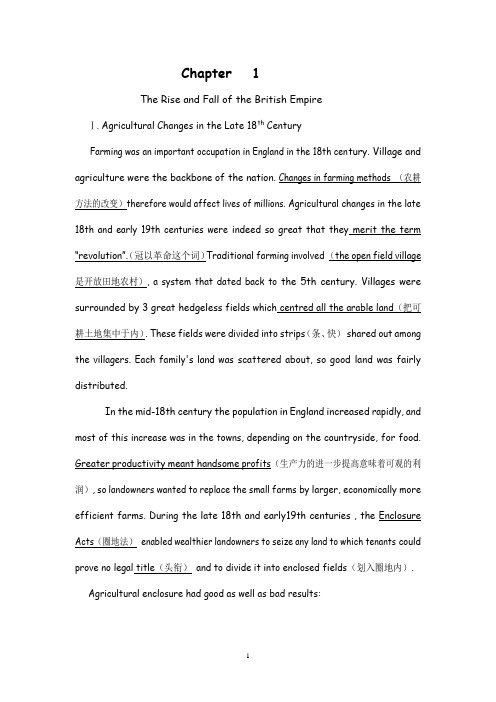
Chapter 1The Rise and Fall of the British EmpireⅠ. Agricultural Changes in the Late 18th CenturyFarming was an important occupation in England in the 18th cen tury. Village and agriculture were the backbone of the nation. Changes in farming methods (农耕方法的改变)therefore would affect lives of millions. Agricultural changes in the late 18th and early 19th centuries were indeed so great that they merit the term “revolution”.(冠以革命这个词)Traditional farming involved (the open field village 是开放田地农村), a system that dated back to the 5th century. Villages were surrounded by 3 great hedgeless fields which centred all the arable land(把可耕土地集中于内). These fields were divided into strips(条、快)shared out among the villagers. Each family's land was scattered about, so good land was fairly distributed.In the mid-18th century the population in England increased rapidly, and most of this increase was in the towns, depending on the countryside, for food. Greater productivity meant handsome profits(生产力的进一步提高意味着可观的利润), so landowners wanted to replace the small farms by larger, economically more efficient farms. During the late 18th and early19th centuries , the Enclosure Acts(圈地法)enabled wealthier landowners to seize any land to which tenants could prove no legal title(头衔)and to divide it into enclosed fields(划入圈地内). Agricultural enclosure had good as well as bad results:(1) Farms became-bigger and bigger units as the great bought up(随着大农场兼并小农场)the small;(2) more vegetables, more milk, more diary product were consumed, and diet became more varied(饮食种类更加丰富);(3) enclosure was a disaster for the tenants evicted(驱逐)from their lands by the enclosures. These peasant farmers were forced to look for work in towns, which rapidly became hopelessly overcrowded. Riots erupted in many areas but they could not prevent the march of progress. In Ireland and the Scottish Highlands land(苏格兰高地)enclosure led to mass emi gration, particularly to the New World(新大陆);(4) a new class hos tility was introduced into rural relationships. Concentration of land in fewer hands increased the price of land and dashedthe labourers hopes (粉碎了希望)of ever owning his own land. Many had to leave the land to survive(背井离乡去谋生). Others became wage labourers(工薪阶层), earning rates which were very low in spite of agriculture's new prosperity(尽管农业繁荣).讨论:总体上讲,英国圈地运动功大于过,一方面为城市提供了劳动力和粮食,另一方面,农村实现了现代化,农民成为市民。
the fall of British Empire

The Beginning of the Decline ---Boer War
By the late 18th century,Britain started the battle to gain and maintain a footing地位 in Africa (Boer war). Though the war ended with the Empire’s success, Britain paid a high price for its success. Furthermore, the success pushed Britain into an awkward situation.
The consequence of British Empire After the war, many Commonwealth nations and colonies wanted to exercise their independence (e.g., India, 1947). Britain also wanted to rid of the responsibilities and/or problems associated with dependent nations or colonies (e.g., Newfoundland, 1949, Rhodesia, 1970). This process continues to this day
Inequality and strihistory repeatedly demonstrates, a presence of inequality typically results in resentment and rebellious acts. A crown colony, which in the hierarchy of British Colonialism, was at the bottom of the pile. Britain had a rigid class structure in its society. The majority power and wealth were held tightly in the middle and upper class, and white gentlemen were believed to be superior, intelligent and suit to govern. With such strict hierarchy, people from different class should speak different language, wear different cloths, take different education and hang around different places. This condition largely hindered the development of the social, culture, and economy in Britain. The fuel of the British Empire was not coal or wool, after all, but an incredible lack of concern for those trampled践踏 underfoot in the quest for profits. With the fall of the noble class in Britain, so did the Empire itself.
Chapter05 The Rise and Fall of the British Empire (1688-1990)

Chapter 5 The Rise and Fall of the British Empire(1688-1990)第五章英帝国的兴衰I.Whigs and Tories辉格党人和托利党人这两个政党名称皆起源于1688年的光荣革命,皆以绰号命名。
辉格是对牧牛人的贬称,而托利是爱尔兰语歹徒的意思。
泛泛而言,辉格人是指那些反对绝对王权、支持新教徒享有宗教自由权利的人们。
第一位沙夫茨伯雷伯爵(1621-1683)被视为辉格党首任领袖。
托利党人是指那些支持世袭王权、不愿去除国王的人。
辉格党人在19世纪中叶与持不同意见的托利党人结盟组成自由党。
托利党则为保守党的前身,至今还保留托利党这个绰号。
(Whigs and Tories) these two names originated with the Glorious Revolution (1688).Loosely speaking, the Whigs were those who opposed absolute monarchy and supported the right to religious freedom for Nonconformists.The Whigs were to form a coalition with dissident Tories in the mid-19th century and become the Liberal Party.The Tories were the forerunners of the Conservative Party, which still bears the nickname today.在19世纪初,辉格党没有特定的纲领,也不是现代意义上团结一致的政党。
他们还没有组建政党结构,例如没有政党基金。
辉格党人主张:(1)削弱王权(比如任命政府重要官员的权力);(2)同情非国教教徒(即已脱离国教的卫理公会及其他新教派别);(3)保护商人和银行家的利益。
- 1、下载文档前请自行甄别文档内容的完整性,平台不提供额外的编辑、内容补充、找答案等附加服务。
- 2、"仅部分预览"的文档,不可在线预览部分如存在完整性等问题,可反馈申请退款(可完整预览的文档不适用该条件!)。
- 3、如文档侵犯您的权益,请联系客服反馈,我们会尽快为您处理(人工客服工作时间:9:00-18:30)。
Greed and Decline in Colonization贪婪和殖民衰落
Ironically, the factor that caused Britain’s rise in the first place turned to against it. In the name of bringing civilization and wealth to the other countries, the British established what became known as colonial rule over a number of territories, including what would become known as the United States. With one by one territory had be acquired, and one after one country came under the umbrella of the British Empire, greed settled in and the Empire got lost in its own success.
On one hand, continuous war depleted耗尽 Britain millions of lives, millions of dollars, and a huge debt borrowed from other Countries.
On the other hand, British’s success in African aroused the hostilities of the other European Countries. They believed that British had gained a lot in Africa---the golden of Land. Therefore, French, German and Russia made an alliance to against British secretly. Facing with troubles at home and menaces from abroad, Great British did not have the power, or the capital resources资本来源 to maintain and manage its empire.
The consequence of British Empire After the war, many Commonwealth nations and colonies wanted to exercise their independence (e.g., India, 1947). Britain also wanted to rid of the responsibilities and/or problems associated with dependent nations or colonies (e.g., Newfoundland, 1949, Rhodesia, 1970). This process continues to this day
The Beginning of the Decline ---Boer War
By the late 18th century,Britain started the battle to gain and maintain a footing地位 in Africa (Boer war). Though the war ended with the Empire’s ቤተ መጻሕፍቲ ባይዱuccess, Britain paid a high price for its success. Furthermore, the success pushed Britain into an awkward situation.
Summary
During the 18th century, the colonization [,kɔlənai'zeiʃən] 殖 民化 of the British Empire went into decline. After the First World War, the trend of Britain’s decay was very obvious. Then after the Second World War, the country’s economic power was largely weakened and also the political position in the world was declined rapidly. What’s more ,after the two wars, the Empire was faced with the anti-war feeling反战情绪 and also the menace威胁from the other European countries. Throughout the mid 20th Century, the Empire’s colonies had diminished. India and Pakistan separated themselves from the British Empire’ domination统治, so did many African countries. The power, either in land or at sea couldn’t resist its fate of fall.
Inequality and strict hierarchy等级制度
As history repeatedly demonstrates, a presence of inequality typically results in resentment and rebellious acts. A crown colony, which in the hierarchy of British Colonialism, was at the bottom of the pile. Britain had a rigid class structure in its society. The majority power and wealth were held tightly in the middle and upper class, and white gentlemen were believed to be superior, intelligent and suit to govern. With such strict hierarchy, people from different class should speak different language, wear different cloths, take different education and hang around different places. This condition largely hindered the development of the social, culture, and economy in Britain. The fuel of the British Empire was not coal or wool, after all, but an incredible lack of concern for those trampled践踏 underfoot in the quest for profits. With the fall of the noble class in Britain, so did the Empire itself.
The effect of war
The first clear sign of decay was most likely to be the South African War (1899-1902), when Britain invaded Transvaal and the Orange Free State. World War I had a devastating 毁灭性的effect on Britain, both in terms of manpower and financially. An entire generation of young men was quite literally destroyed, including massive numbers of soldiers from the Commonwealth. There was a post-war recession战后的不景气, followed by a brief amelioration改善 in the economy in the early to mid 1920s. World War II began in 1939, ending the Depression, but not the economic damage. It took Britain at least ten years to repair the damage wrought by the Depression萧条 and the war.
